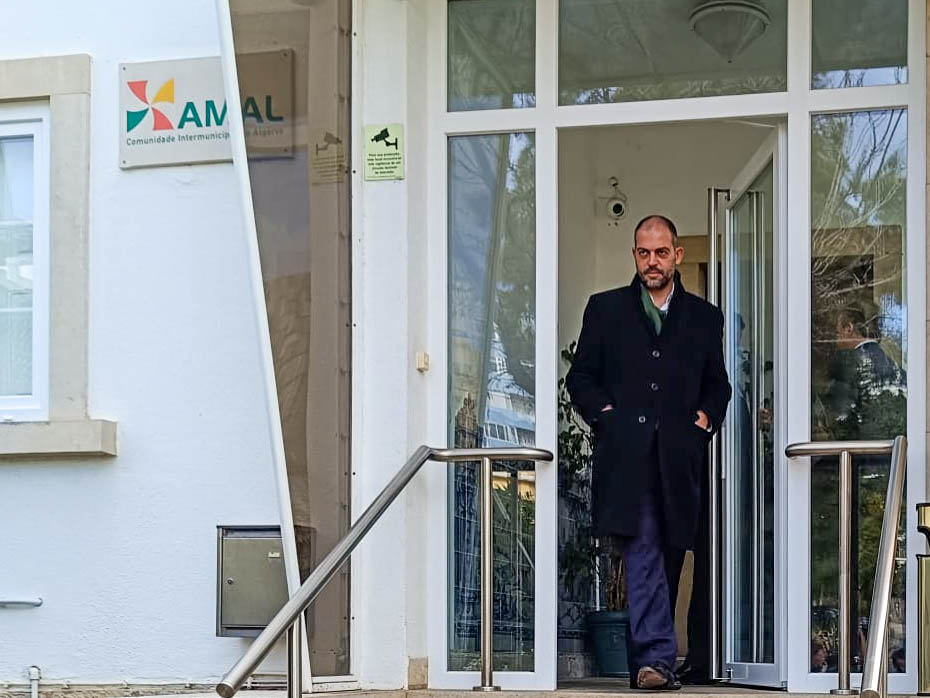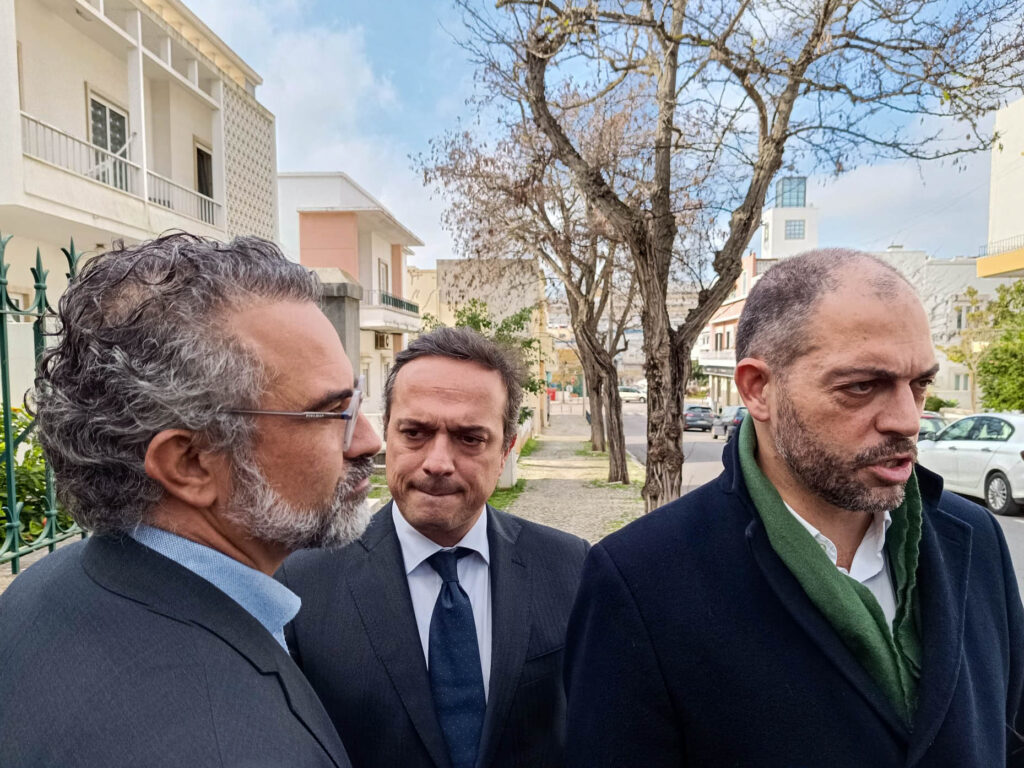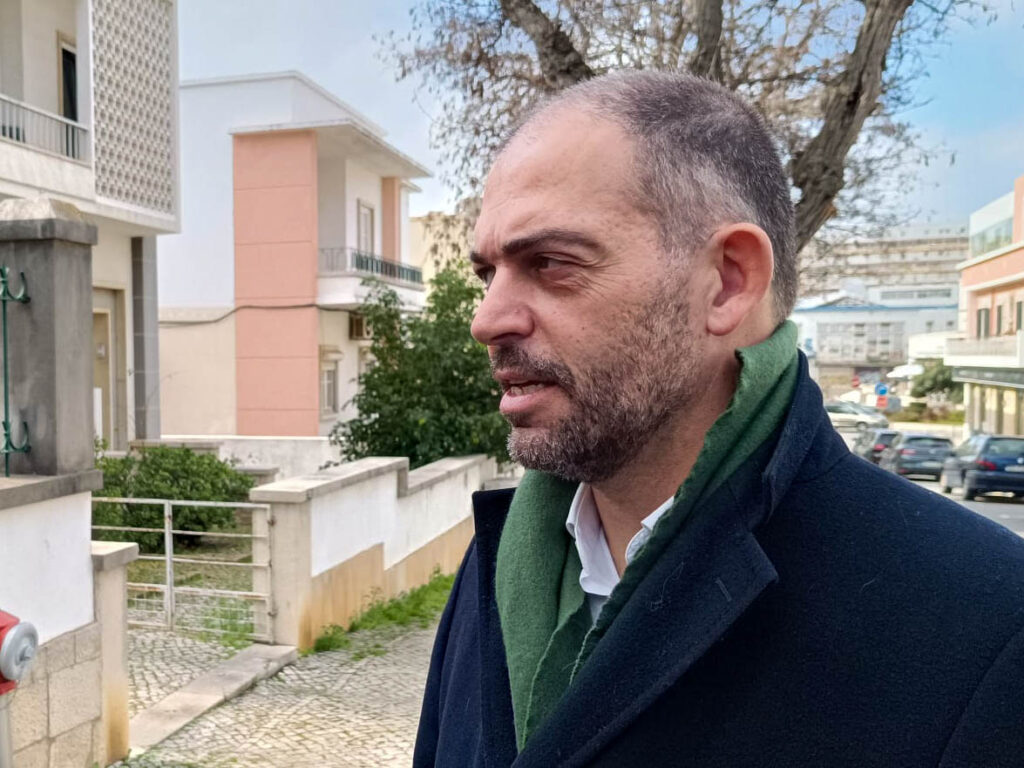An agricultural sector in survival mode and with minimal services, with regard to irrigation, a reduction in the water made available to the tourism sector and a tightening of the belt in domestic consumption, with a reduction in pressure on the network and the end of second meters, are some of the measures that will be taken to ensure that the Algarve has water until the end of the year, Duarte Cordeiro, Minister of the Environment, announced today in Faro.
The member of the Government spoke to journalists on the sidelines of a session he held with the presidents of the region's municipalities, at the headquarters of AMAL – Algarve Intermunicipal Community, this Friday morning, and advanced some of the measures that will emerge from the meeting of the Interministerial Drought Commission, which will take place next week, in the Algarve.
This working meeting followed others, «with the tourism and agriculture sector», in which the minister, António Pina, president of AMAL, and José Apolinário, president of the Regional Coordination and Development Commission (CCDR) of the Algarve, last week.
«During this week, we will finalize the measures that we all discussed and analyzed together, which will be the best to maintain the efficiency and reductions in consumption that are necessary in the territory», summarized Duarte Cordeiro.
Next week, after the meeting of the Interministerial Drought Commission, «there will be a resolution by the Council of Ministers, which will bring together all of the ongoing decisions».
And, if the words of the member of the Government are to be believed, there is widespread awareness that these are necessary measures, taking into account the seriousness of the situation.
«The reaction of the municipalities, at today's meeting, was one of work, of availability for us all, collectively, to assume the various responsibilities that we have to have, so that we can, throughout the year, manage the territory's water resources», he assured the minister.

In order for the measures to be accepted "by everyone, without exception", the ministry urged all sectors to look at the water available in the Algarve's reservoirs and aquifers and, at the same time, to think about how to "compensate for the lack of water from our reservoirs, but respecting the limits of the aquifers».
«Taking into account what are pessimistic precipitation forecasts, we considered the worst year of the last 10 and not the average of the last 10, also taking into account all these variables and what is the essential consumption that we have to preserve, which is the people's consumption, domestic consumption, urban consumption. Afterwards, we obviously made water available to the remaining sectors», summarized the minister.
In the case of agriculture, what the minister guaranteed to farmers was the availability of “water to guarantee the survival of species, trees and agricultural crops”.
The reduction in surface water used for irrigation is already certain. «What we can see is that, by guaranteeing survival agriculture, there could be a reduction in water availability in the Odeleite reservoir by 70%. In Funcho it will be 50%».
Last year, highlighted Duarte Cordeiro, agriculture in the Algarve «consumed around 135 cubic hectometers of water, of which only 35 came from reservoirs».
«And we are talking about a reduction, within this universe, of the 35 cubic hectometers of reservoirs, and we are talking about a reduction that guarantees the water availability that we need to guarantee supply, essential urban consumption», he explained.
Then, «there are the water abstractions that the agricultural sector has, many of them private abstractions, in which we are recommending a 15% reduction in these abstractions from these boreholes, so as not to create excessive pressure on the aquifers».
«Obviously it will have an impact on the agricultural sector, an impact that is now being evaluated and measured by the CCDR, which is the regional responsible for Agriculture in the Algarve, so that we can understand how we can compensate and support this sector», he said.
As for urban consumption, “it consists of tourism and domestic consumption. Around 40% is from the tourism sector. And the tourism sector, with whom we spoke, will adopt a set of measures to ensure that we reach that 15%».
«In the domestic sector, among other aspects that we are studying, one of the measures we are working on is, for example, reducing pressure, which we will analyze technically in the months of January and February, to understand whether, safely, We were able to apply the measure further ahead», that is, in the summer, when demand is greater.
Another measure, «which has been discussed with AMAL for a long time, is the possible suspension of second counters», said the minister, who admits that «there may be penalties for those who spend more».

To ensure that these measures are respected, a working group will be created “which is led by ARH, APA and CCDR. This working group will monitor all the measures that we will adopt in the agricultural sector, the tourism sector and domestic consumption».
«And there will be five technical working groups: one that concerns the monitoring of measures in agriculture, which will be led by the CCDR, and one that will monitor savings measures in the tourism sector, led by ADEN, the national agency related to water efficiency and energy efficiency”.
There will also be a working group related to domestic consumption measures, which will be led by Águas do Algarve, one on inspection, which will be led by ARH, and one related to awareness campaigns for all consumers, which will be led by the Algarve tourism region.
«In all of them, at least one municipality will be represented by AMAL, to ensure that there is involvement of all municipalities in all the work that will be developed», concluded Duarte Cordeiro.
Asked why more restrictive measures on water use in the urban sector have not yet been advanced, namely those aimed at large domestic consumers, private swimming pools and gardens, some of which have been on the table since last summer, Duarte Cordeiro guarantees that whether you are going to “implement them now”.
In the meeting with the mayors, the possibility was discussed "for all municipalities to apply what will be a novelty, a regulation on scarcity", so that "there is no municipality A implementing one regulation, municipality B implementing another ».
This regulation “will already provide for fines” and will give local authorities the power to, for example, ban second meters, with more affordable water and which are most used for watering private gardens and filling swimming pools.
On AMAL's part, more than the willingness to implement the measures that will be announced, there is an urgency for the regulation to be approved that will allow local authorities to restrict consumption.
«I would like to have this regulation by the end of the month, because the urgency of the situation requires it», António Pina assured journalists, on the sidelines of today's meeting.



















Comments